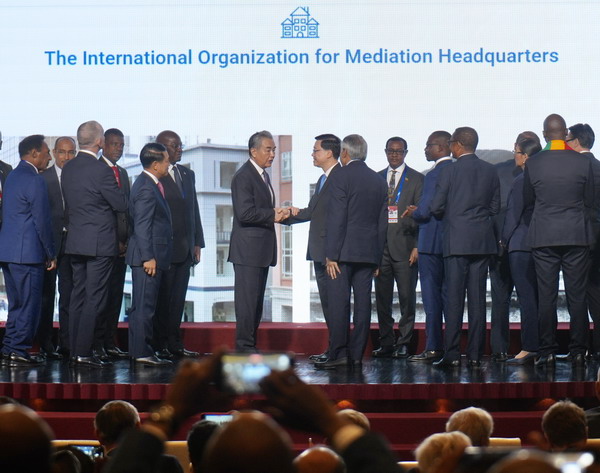
The People’s Republic of China

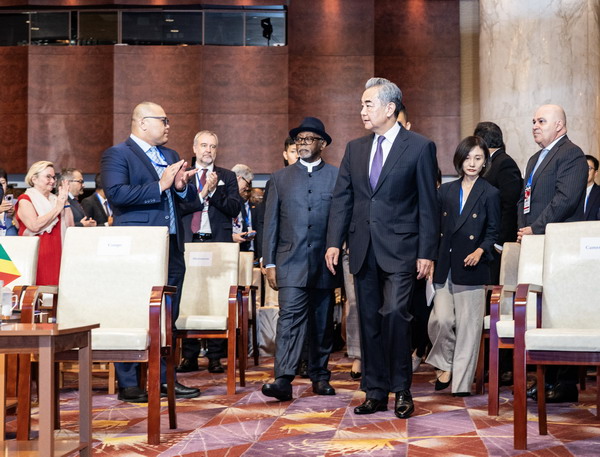
On May 30, 2025, the signing ceremony of the Convention on the Establishment of the International Organization for Mediation (IOMed) was held in Hong Kong. Member of the Political Bureau of the CPC Central Committee and Foreign Minister Wang Yi attended the event and delivered remarks. Around 400 high-level representatives from 85 countries across Asia, Africa, Latin America, and Europe, as well as nearly 20 international organizations, attended the event. Among them, 33 countries signed the Convention on site, becoming the founding members.
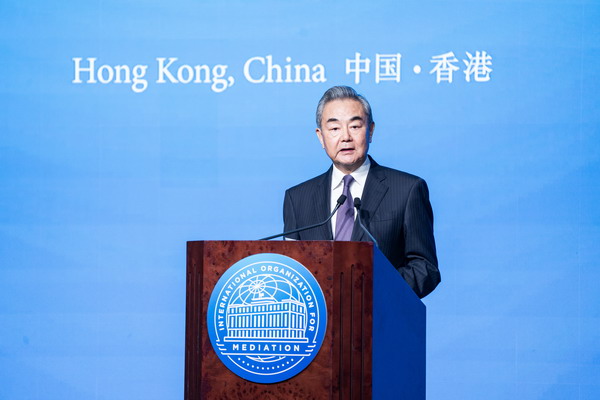
Wang Yi said that the U.N. Charter, in its preamble, states a clear purpose of different countries living together in peace and maintaining international peace and security. China always advocates addressing disagreements in a spirit of mutual understanding and accommodation, building consensus through dialogue and consultation, promoting development through win-win cooperation, and solving issues with a future-oriented perspective. China has been actively exploring ways of hotspot issue settlement that carry the Chinese touch. Three years ago, China and like-minded countries jointly initiated the establishment of the IOMed. Through diligent efforts, they have finally concluded the Convention, and received extensive support and positive responses from the international community. An innovative step in international rule of law, the IOMed has great significance in the history of international relations.
The establishment of the IOMed is an actualization of the purposes and principles of the U.N. Charter. It will fill an institutional gap in international mediation and serve as an important public good in the field of the rule of law for better global governance.
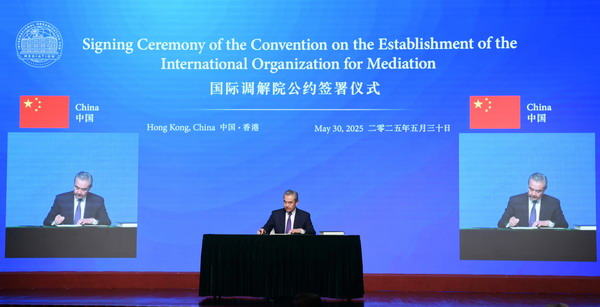
The establishment of the IOMed is an example of a civilizational belief in harmony. It can help transcend the "you-lose-I-win" zero-sum mentality, promote the amicable resolution of international disputes, and foster more harmonious international relations.
The establishment of the IOMed is an epitome of inclusiveness in the culture of the rule of law. It respects the wishes of parties concerned, and draws upon the strengths of being more flexible, cost-effective, convenient and efficient. And it will complement and form synergies with litigation, arbitration and other existing international dispute settlement mechanisms.
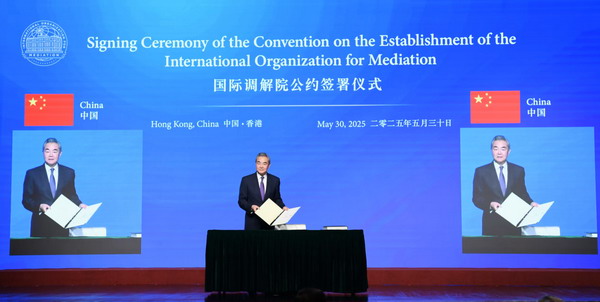
Wang Yi stated that China looks forward to signatories' early ratification of the Convention and welcomes the active participation of more countries.
He called on signatories to honor the purposes of the U.N. Charter, ensure voluntary participation, equal decision-making and common interests, and see to it that all parties' legitimate concerns are respected and win-win outcomes achieved.
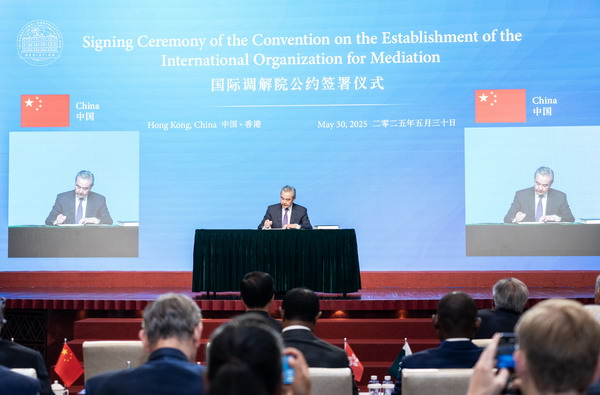
He called on signatories to promote reconciliation, cooperation and harmony, cultivate a culture and raise the awareness of mediation, and put in place at an early date a set of world-class mediation rules and mechanisms featuring autonomy, flexibility, pragmatism and high efficiency.
He called on signatories to uphold fairness, justice and equity, stress the true spirit of the rule of law, ensure both procedural justice and outcome justice, enhance the participation of developing countries, and improve the representation and say of the Global South in international governance.
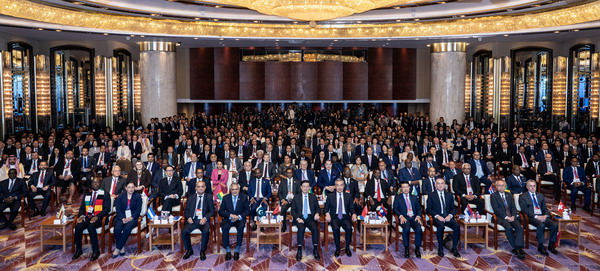
He called on signatories to advocate extensive consultation and joint contribution for shared benefit, make solid progress in the structure of the IOMed, and make the IOMed globally-oriented and dedicated to serving the world.
Wang Yi said that as decided through consultation among countries participating in the negotiation of the Convention, the IOMed will be headquartered in Hong Kong, whose handover is itself a success story of peaceful settlement of international disputes. What's more, the city enjoys exceptional advantages in international mediation, for example, its affinity to the motherland and connection to the world, and its strength in both common law and civil law. Wang Yi expressed the belief that the IOMed will grow stronger with Hong Kong. The rising star in international rule of law and the Oriental Pearl will shine brightly together.
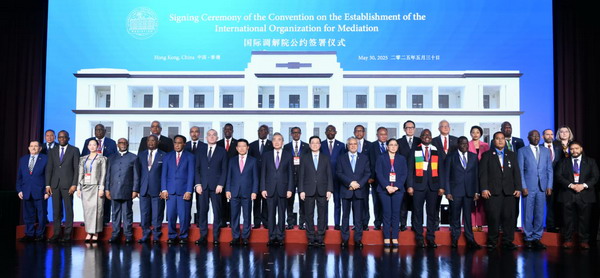
Pakistani Deputy Prime Minister and Foreign Minister Mohammad Ishaq Dar, Zimbabwean Minister of Foreign Affairs and International Trade Amon Murwira, Attorney General of Nicaragua Wendy Carolina Morales Urbina, Serbian Minister of Justice Nenad Vujić, Swiss Foreign Minister Ignazio Cassis, and Under-Secretary-General of the United Nations Li Junhua delivered remarks, respectively. All parties highly recognized the contemporary value and far-reaching significance of the IOMed, expressing that the establishment of the IOMed is timely, crucial, and of historic significance in the current world with increasing conflicts and intensifying divisions. The IOMed aligns with the purposes and principles of the U.N. Charter and embodies respect, mutual trust, fairness, and harmony. It serves as an effective measure to strengthen multilateralism, and will become a key pillar in improving global governance, and a new milestone in advancing the rule of law worldwide. They called on more countries to sign and ratify the Convention, and to jointly achieve lasting peace and sustainable development through mediation. All parties commended China's active role as a major country, and the IOMed is expected to contribute to the peaceful resolution of disputes and the promotion of friendly cooperation among nations.
Chief Executive of the Hong Kong Special Administrative Region John Lee delivered a speech to welcome the establishment of the world's first intergovernmental international organization dedicated to mediation in Hong Kong. Hong Kong will leverage the institutional strengths of the "One Country, Two Systems" and fully support the work of the IOMed.
